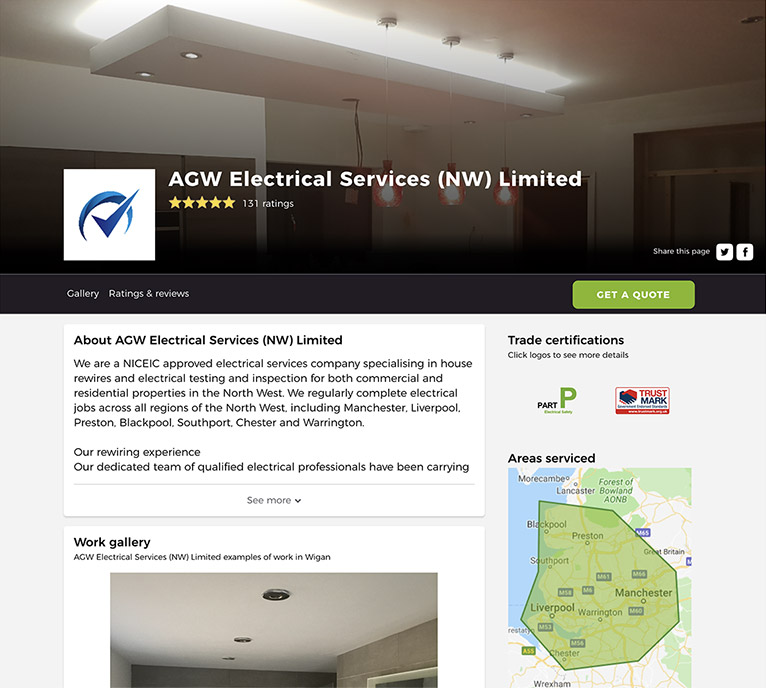Rewire your home to ensure that your electrics are safe, future-proof, and compliant with current regulations.
Maintaining the condition of a property’s electrics is one of the most important responsibilities that comes with being a homeowner or landlord. Faulty or unsafe electrics can cause life-threatening injury and pose a serious fire hazard, making it essential that you keep an eye on the age and condition of your electrics to ensure that you spot any potential problems before they become a danger.
Whilst paying for a full electrical rewire may not seem like the most exciting investment, it is one that has substantial benefits. A full rewire will not only keep you, your family and your property safe, it can also futureproof your home and increase your property’s value.
What does rewiring a house involve?
Your home’s electrical cables run under the flooring and through the walls, so rewiring will require flooring to be lifted and walls drilled into, making it a considerably messy and disruptive job.
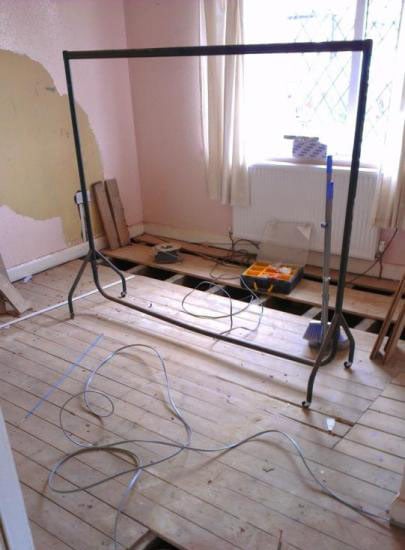 If you’re renovating a house, a rewire should be completed at the same stage as any plumbing or work to the heating system, and certainly before any plastering or cosmetic work is undertaken.
If you’re renovating a house, a rewire should be completed at the same stage as any plumbing or work to the heating system, and certainly before any plastering or cosmetic work is undertaken.
During a full rewire your electrician will:
- Install new cabling.
- Fit new back boxes on sockets and switches.
- Rewire telephone and tv aerial sockets.
- Rewire power and lighting circuits.
- Add or move sockets, light fixtures, and switches if required.
- Add modern electrical technology if required, e.g. automated lighting and speaker cabling.
Rewires are generally completed in two stages:
First stage – cabling, wiring, circuits and back boxes are all replaced.
Second stage – lighting fittings and faceplates on sockets and switches and are installed. All wiring is connected to the consumer unit to make everything live.
Benefits of rewiring
Although safety is the primary reason to rewire your home, there are also several functional benefits of updating your home’s electrical cables too.
Here are the top benefits of rewiring your home:
- Peace of mind that you have invested in a safer electrical system.
- Reduces the risk of an electrical fire.
- Ensures that your electrics are compliant with current regulations.
- Increases your home’s value.
- You can choose all new fixtures and fittings.
- You can choose where new sockets and switches go.
- Make your home more energy efficient.
- Install new ‘smart’ technology.
How often should a house be rewired?
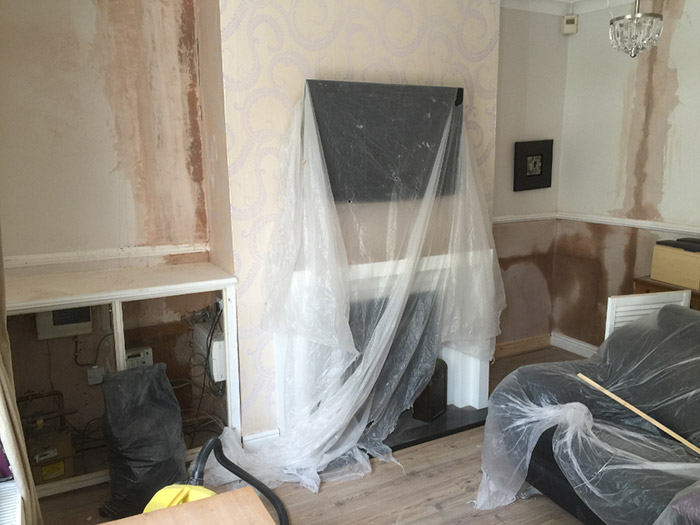 There is no definitive time frame for rewiring a house, but if your home’s wiring is over 25 years old it may need either updating, or a full rewire, to bring it up to current safety standards.
There is no definitive time frame for rewiring a house, but if your home’s wiring is over 25 years old it may need either updating, or a full rewire, to bring it up to current safety standards.
Electrical inspections should be carried out every 10 years if you own your house, and every 5 years if you’re a landlord to make sure that everything is still safe and in full working order.
When does a house need rewiring?
Aside from when the electrical system becomes outdated, there are a couple of other instances that may require you to get your home rewired:
When electrics become unsafe – if at any point your electrics become unsafe or stop meeting current regulations, it is very important that you get them fixed as soon as possible to avoid fire or injury.
If you make significant alterations or additions to your wiring – all new wiring will need to conform to Part P of the Building Regulations and existing wiring will need to be improved to make sure it can cope with the additional load of the new wiring being added.
Signs your home may need rewiring
If your electrics are displaying any of the following problems or signs of being outdated, then you should urgently seek help and advice from an electrician.
- Discolouration around sockets or plugs.
- Fuses keep blowing.
- Buzzing or crackling noises.
- Burning smell.
- Constantly flickering lights.
- Wiring has rubber, fabric or lead cabling insulation (modern wiring should be PVCu coated).
- Old fashioned fuse box (consumer unit) with a wooden back and white ceramic fuses.
Wiring regulations (18th edition)
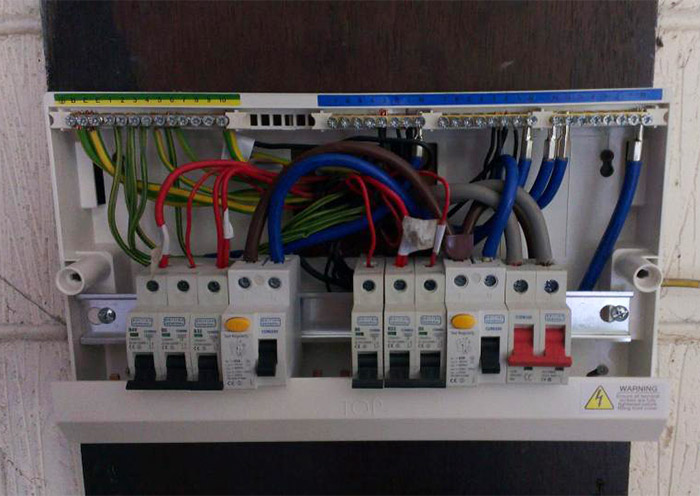 Wiring regulations are in place to protect you, your family, and your home from electrical hazards. It is the homeowner or landlord’s responsibility to ensure that they have proof that all electrical work carried out on their property has been completed according to current regulations. Being unable to prove this is a criminal offence.
Wiring regulations are in place to protect you, your family, and your home from electrical hazards. It is the homeowner or landlord’s responsibility to ensure that they have proof that all electrical work carried out on their property has been completed according to current regulations. Being unable to prove this is a criminal offence.
All electrical work must be compliant with Approved Document Part P of the Building Regulations. Part P states that: ‘all electrical work, no matter how minor, should follow the rules in BS 7671 for (the) design, installation, inspection, testing and certification.’
BS 7671, which is often simply referred to as the ‘IET wiring regulations’ lays out the UK’s national standard for safe electrical installation.
The most recent update to the wiring regulations was made available on 2nd July 2018 and focusses on the introduction of energy efficiency performance levels.
To ensure that all electrical work carried out in your home meets the required standards you should always use an electrician who is registered with a government-approved scheme and make sure that you receive an Electrical Installation Certificate when the job is complete.
Ask an Expert: Andy from AGW Electrical Services
We asked one of our tradespeople, Andy from AGW Electrical Services, to answer a few of the commonest questions homeowners and landlords have about rewiring their properties. Andy and his team at AGW specialise in house rewires and carry out rewires and certification all over the North West. The team at AGW are so experienced in their field they are regularly trusted to carry out very high end jobs, like rewiring for Manchester United’s footballers’ homes, including David Beckham!
Can I rewire my own house?
Rewiring a house is not a simple DIY project and we recommend that you always employ the help of a professional and qualified electrician to avoid injury and to make sure the job is completed according to current safety regulations.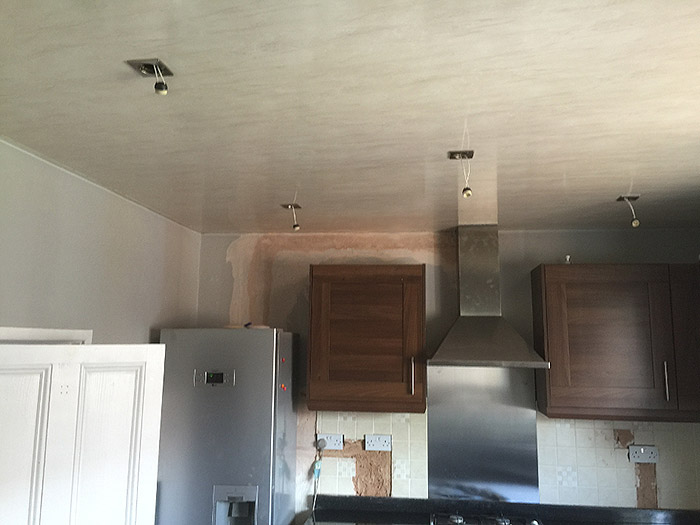
Andy from AGW Electrical Services explains why. “It is a lawful requirement for a house rewire to be completed by a registered electrician. The job must be installed and tested in compliance with BS7671 and requires notification with local building control, detailing the works carried out.“
The consequences of getting the job wrong are too high to risk doing it yourself. Unsafe electrics could cause fire damage and serious injury to the people in your home.
How long does it take to rewire a house?
The length of time it will take to rewire your home will depend on the size and scope of the project. Generally, to rewire a house it should take somewhere between 2-10 days depending on the number of rooms being rewired, the extent of the wiring, whether the property will be occupied, and the number of additions or modifications being made.
Andy from AGW explains, “an average 3-bedroom semi-detached property would take a team approximately 3 days to complete. It is dependent on your circumstances, whether occupied, furnished and ultimately how many points are being installed. A rewire with 50 sockets would take twice as long as one with 25.”
Can I live in the house during the rewire?
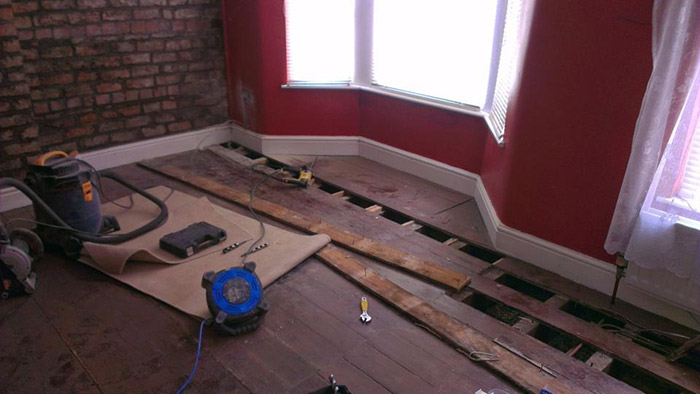 Yes, you can remain in your house whilst it is being rewired but be prepared for some mess and disruption if you choose to do so.
Yes, you can remain in your house whilst it is being rewired but be prepared for some mess and disruption if you choose to do so.
Andy and his team carry out rewires on both houses that are occupied and unoccupied, he explains what to expect if you choose to stay in your home while it’s being rewired. “If you have the luxury of being able to stay somewhere else whilst the work is carried out, this is a bonus. However, we carry out more occupied projects and try to make you as comfortable as possible throughout the process. Albeit with minimal power and using extension leads to function for a few days. At AGW we carry out these jobs using teams to get it completed as quickly as possible.”
There is likely to be a lot of dust in the air while the work is being carried out and for a few days after the job has been completed. Some redecorating will be required after the job is complete too. Because electric wires run through walls and under flooring, areas of the wall and sometimes the ceiling will need re-plastering and painting or wallpapering.
Has the latest update to the wiring regulations (18th edition) changed how you perform wiring jobs?
The latest 18th edition only came into play in January 2019. Andy explains why it hasn’t really changed the way AGW work as they already install premium systems, and why customers should beware of electricians offering much lower quotes on work.
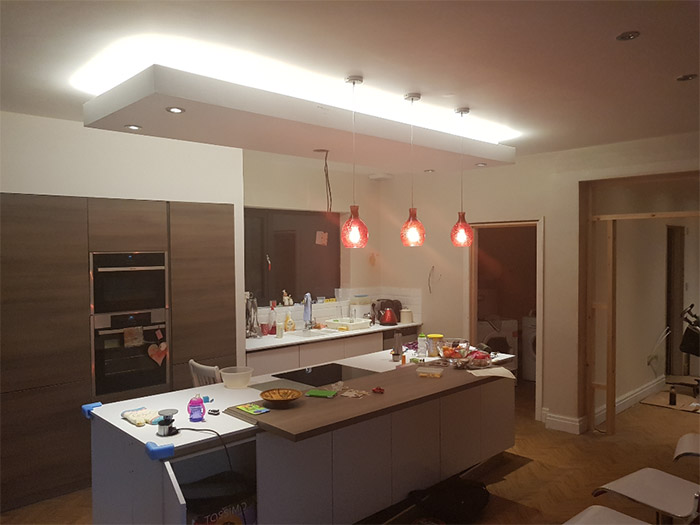 “It hasn’t really changed the way we install, as we install premium future-proofed, efficient systems anyway. Amendments to regulations are always trying to underpin and force contractors to stop scraping just above the minimum requirements by lifting them accordingly. It’s a difficult part of my job trying to explain this to clients when they are comparing quotes because contractors are generally not transparent with the system installed. Say for example, there are 24 sockets in the house. It would be perfectly ok to distribute these across 2 socket circuits in a 3 bedroom semi according to the regulations. But it would be at its limit. We would install 3 circuits, so if you wish to add to the system in the future those circuits aren’t going to be overloaded. Its future-proofed with scope for additions to be made.”
“It hasn’t really changed the way we install, as we install premium future-proofed, efficient systems anyway. Amendments to regulations are always trying to underpin and force contractors to stop scraping just above the minimum requirements by lifting them accordingly. It’s a difficult part of my job trying to explain this to clients when they are comparing quotes because contractors are generally not transparent with the system installed. Say for example, there are 24 sockets in the house. It would be perfectly ok to distribute these across 2 socket circuits in a 3 bedroom semi according to the regulations. But it would be at its limit. We would install 3 circuits, so if you wish to add to the system in the future those circuits aren’t going to be overloaded. Its future-proofed with scope for additions to be made.”
How much does it cost to rewire a house?
The cost to rewire a house can vary quite dramatically, Andy explains what factors will affect the price you can expect to pay.
“No two jobs are the same and circumstances vary. Our company is about reading the specific needs of the client and the project. If the house is pristine, it’s going to take longer to install than a refurbishment. Is it occupied or unoccupied? It’s also about managing the planning well from both parties. If you have other jobs happening at the same time, e.g. a new kitchen or extension, then it’s important to consider the time and number of visits required. A rewire with nothing else going on will take between 3 days to a week. If, however, it’s a rewire of the existing property, with two return visits to wire a new extension and then connect everything up it would be 5 days.
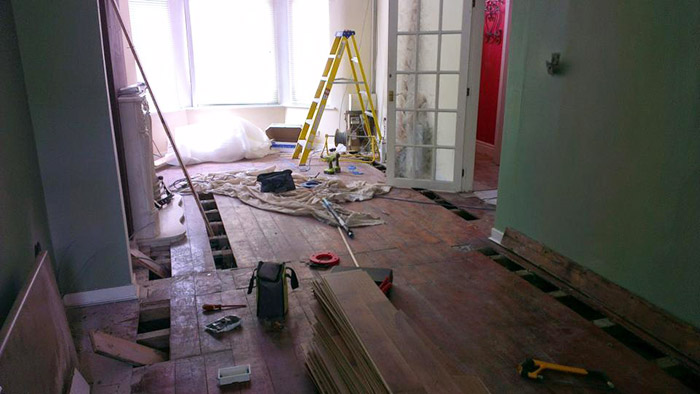 The final consideration is the wide fluctuation in material costs, on a month-to-month basis as most materials are imported and the Brexit factor has inflated these costs dramatically since the Eu referendum.
The final consideration is the wide fluctuation in material costs, on a month-to-month basis as most materials are imported and the Brexit factor has inflated these costs dramatically since the Eu referendum.
Currently an average 3 bedroom semi, with an average amount of accessories will cost around the £3,000 mark.”
View Rated People’s guide to the cost of rewiring a house based on the number of rooms here.
Future-proof your home’s wiring
If you’re considering having your home rewired, then be sure to future-proof the project by thinking carefully about how your requirements may change over the next 10 years or so.
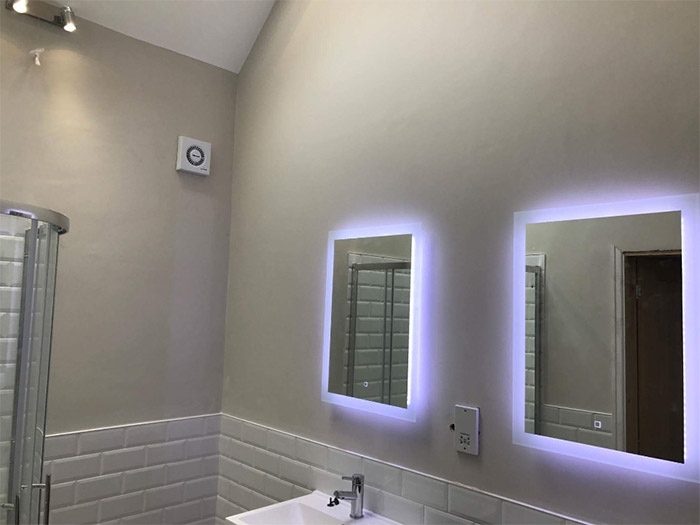 As our reliance on technology increases, so do our electrical requirements. Think about how many sockets you used to use in your home and how many you now require. It’s a good idea to add one or two more sockets than you think you’re going to need to meet future demand.
As our reliance on technology increases, so do our electrical requirements. Think about how many sockets you used to use in your home and how many you now require. It’s a good idea to add one or two more sockets than you think you’re going to need to meet future demand.
Consider any electrical alterations or additions that you may require in the future, like CCTV, a home entertainment system, or ‘smart’ technology. Advise your electrician of these requirements so that they can bear this in mind when they install your new electrical system.
In an ever-connected world, don’t forget to consider network cabling for faster internet access when rewiring your home. Whilst many people rely on wireless internet, a wired connection is generally faster and more reliable.
The demand for convenient and energy-efficient ‘smart’ technology is growing and if you’re rewiring your home it is the perfect time to get it installed. From energy-efficient ‘smart’ lighting and heating controls, to multi-room visual and audio systems, smart technology is the future.
Find trusted local electricians
Ready to rewire your home? Get quotes from trusted, local electricians in your area by posting your job on Rated People.
